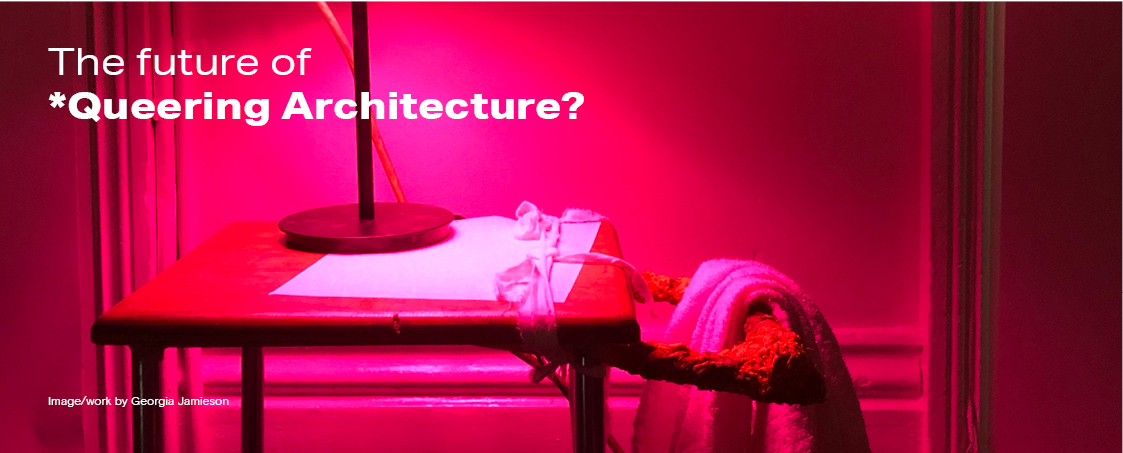
OVERVIEW
Get online with the Gender Equity Transformation team (GET) of the Australian Institute of Architects for ‘Queering Architecture’: a panel discussion with a performative twist, critiquing contemporary design methods and their spatial implications from queer perspectives.
With a phosphorescent line-up we take the plunge, to ask what kinds of cities and spaces we can imagine together if we celebrate our voices, talents, costumes, and rage!
DATE:
Thursday 3 March 2022
TIME:
6.30pm -8.30pm (AEST)
SPEAKERS:
Sean Coyle
Dr Sean Coyle is the Head of Design and Arts Management at Toi Whakaari / New Zealand Drama School and a a Wellington based scenographer and educator. In 2019 he was awarded Set Designer of the Year at the Wellington Theatre Awards. His most recent publication is Cruising the staged Wonderland: Scenographic photography and the queering of space which is part of Scene Journal’s recently published special on Australian Scenography. Sean is He is a graduate of both Toi Whakaari/New Zealand Drama School and VCA Melbourne, has a Masters degree in art and design from AUT Auckland and a PhD from the University of Tasmania where he also worked as a lecturer within the theatre faculty. Sean was Head of School at the Pacific Institute of Performing Arts (PIPA) in Auckland for 12 years, and from 2018 to 2021 was Lecturer in Scenography at Victoria University of Wellington.
Neph Wake
With a background in architecture and construction, Neph Wake is a client-side project manager delivering capital works projects for cultural institutions such as galleries, museums and performing arts companies. Neph is an irregular writer, researcher and social commentator, including working as a research assistant for ‘Equity and Diversity in the Australian Architecture Profession: Women, Work and Leadership (2011–2014)’, the research project which established Parlour. Proudly out and queer since her teens, she is a former Treasurer for the NSW Gay and Lesbian Rights Lobby and likes to think she’s funnier than she is.
Phoebe Adams
Phoebe Adams, is a queer artist, designer, performer and PhD candidate at the University of Tasmania. Phoebe’s doctoral design work is triggered by frustration and rage at the systematic gender biases within design disciplines. Phoebe uses drag king performance to “mannyfest” nuanced and important commentary for architecture, design and making cultures. Phoebe’s presences on this panel guarantees hilarity with thoughtful critique.
Diana Espiritu
Diana Espiritu is a designer currently specialising in education spaces at Woods Bagot and has worked across a range of community art projects. As projects of public nature require sensitivity, Diana is active in sourcing authentic approaches to research, collaboration and spatial understanding. Originally from Sydney’s West, Diana aspires to embrace equity through an intersectional lens, for all people, beyond binaries and stereotypes. Diana’s honours research continues to inform her practice through its exploration of identity, sexuality and body; deciphering hierarchies of identities alongside social constructs of contemporary consumerist society, the built environment and media space.
Jo Paterson Kinniburgh
With a passion for design practices that counter colonised accounts of place, Jo Paterson Kinniburgh (Karyouakou wugulora) educates and practises in a way that is respectful of Indigenous (hi)stories, cultures, languages and knowledges of Country/whenua. Her experience in architectural practice since 1991 in Aotearoa New Zealand, and now Sydney, led her to embrace the negotiation between cultural protocols to find productive modes of Indigenous and non-Indigenous collaboration. She has been the Director of Education for architecture, landscape architecture and interior architecture in the School of Architecture at University of Technology (UTS), and has remained on faculty there since 2007. She is currently also writing a PhD on the Sydney-specific Aboriginal spatial relations with Country at the Centre for the Advancement of Indigenous Knowledges (UTS) and is a director at Bangawarra.